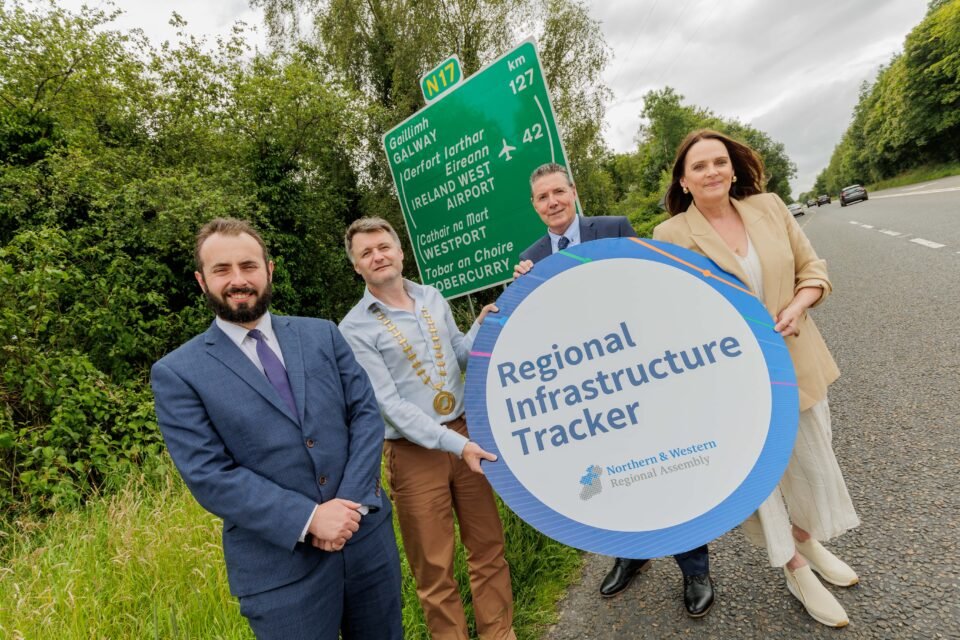The Northern and Western Regional Assembly (NWRA) is urging the government to fast-track the delivery of 13 major infrastructure projects in the north and west of the country.
It comes as a new study, published today (Monday, July 15) by the assembly, found that the region is now on par with the least well-off areas of Europe in terms of infrastructure.
The research shows that investment in transport, health, education, housing and energy infrastructure in the northern and western region is languishing far below that of its counterparts in Ireland and across the continent.
Transport infrastructure is ranked the 17th worst of 234 European regions, the study found.
Infrastructure
The NWRA is one of three regional assemblies in Ireland and represents counties Cavan, Donegal, Monaghan, Leitrim, Sligo, Roscommon, Mayo, Galway.
The organisation’s “Regional Infrastructure Tracker” found that these counties have received less than 10% of the nationwide total investment in infrastructure projects worth more than €1 million, and just 5.7% of investment from infrastructure projects worth more than €20 million.
This is despite the region accounting for 17.6% of Ireland’s population.
The eastern and midlands region of Ireland received 66.5% of investment from projects worth more than €1 million, and 75% of those worth more than €20 million.
As the eastern and midlands region accounts for less than 50% of the population of Ireland, the NWRA believes the figures reveal an obvious bias towards the Greater Dublin Area.
The northern and western Region of Ireland is officially classified as a “transition region” as it has a gross domestic product (GDP) per capita between 75% and 100% of the EU average, the only region in Ireland to hold such a status.
However, the NWRA’s research has found that, in terms of competitiveness, the region ranks below some regions categorised as “less developed”, which are regions with a GDP per capita less than 75% of the EU average.
Positive discrimination
To address these infrastructure deficits, the NWRA believes a policy of “positive discrimination” is needed to deliver regional equality across Ireland and to take pressure off “an ever-expanding greater Dublin area”.
The assembly called for the creation of a ministry for regional development “which would have a significant budget for delivering key infrastructure priorities across the regions”.
The NWRA is also demanding that the government ringfence more than half of the European Regional Development Fund (ERDF) for the northern and western region and prioritise 13 infrastructure projects for the region.
These include the delivery of the Donegal T-Ten road projects and N17 Knock to Collooney Road Scheme, and the reopening of the Western Rail Corridor from Athenry to Collooney.
The report estimates that the total capital cost of delivering these priority projects would range from €4.8 billion to €6.8 billion, which the NWRA said is “considerably lower” than the latest cost estimates for Dublin Metro.

The report also highlighted that 79% of households along the border and 83% in the west have a fixed broadband connection, below the State average of 86%.
More than a quarter of settlements in the region have no spare treatment capacity for wastewater treatment.
Denis Kelly, director of the NWRA, said that we must grow the economy in a manner that benefits all regions.
“Adopting a regional approach for the revised National Planning Framework will be crucial to overcoming these sizeable infrastructure deficits in the northern and western region,” he said.
John Daly, NWRA economist, added that it is “remarkable” that the northern and western region of Ireland is in the bottom 20 EU regions in terms of transport infrastructure, given the exceptional growth of the Irish economy.
“With notable underinvestment also evident across the region’s higher education, research, water, road and rail network, it is no surprise to see that regional inequalities in Ireland have continued to rise as population, employment and income growth remains overly concentrated around the greater Dublin area.
“In addition to this, the level of underinvestment in the region also has the potential to contribute to greater political discontent, with ample research from the OECD noting that rising regional inequalities tend to undermine the trust of regional voters in national governments and lead voters to more extreme political parties or choices,” he said.

